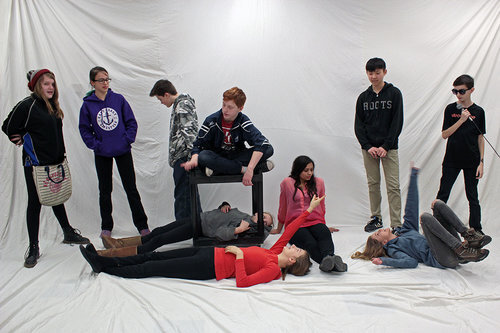EMPIRE ELEVEN
2016
Experimental sound and performance studies with a grade seven band class
I designed a 3 week alternative music curriculum with a class of eleven 13 year olds. We explored the essence of sound and how it informs our relationship with an instrument and the relevance of improvisation in music. Our sessions involved exercises in deep listening, ensemble building through trusting and sharing leading to the comprehension of group dynamics, experimental noise games, sound history lessons, and the constant search for focus in chaos at a time of self-discovery.
EMPIRE ELEVEN's final presentation revealed the choreography of an independent troupe of artists navigating an experimental score full of creative risks that posed many questions for its puzzled audience.
Post-performance interview with two members of EMPIRE ELEVEN
How did playing music in an experimental environment affect you?
Molly I think it was good because we could use more senses than just our hearing. We turned off the lights and closed our eyes and used more things to trigger our senses. The sounds we made would sound different depending on the environment we made them in.
Ryan The environment to me was truly experimental because we did all these different things but in the end nothing turned into what we thought it would be. Everything was fun and random.
What is the value of randomness?
Molly It’s good sometimes because it lets you experiment with something new that you have a talent in. It’s also a good way to have fun because it’s not structured.
Ryan To me, the randomness is more a form of art. You can do something completely random and it could turn out completely beautiful.
What did you learn from the EMPIRE ELEVEN project?
Molly Going back to the environment – different sounds can create different feelings. If there’s a difference in light or environment it can make different emotions. Anything can be an instrument. You can put anything together. The melody and the bass can work together to make a composition. We used the sink, I was making percussive sounds on a reed case, the wheeling cart, glasses with water in them, there were xylophones too, but also running around and using our footsteps as sound.
Ryan For the final performance we had a structure but we also had times where we just made it up as we went, depending on the group dynamic. At some point it clashed and some points it worked nicely. You need structure but you also need to improvise. You need to add a different perspective.
How would you describe the way Emily taught the EMPIRE ELEVEN project?
Molly Fun. Unstructured. A way for kids to understand.
Ryan Fun. Random. Intense. Different. Weird.






